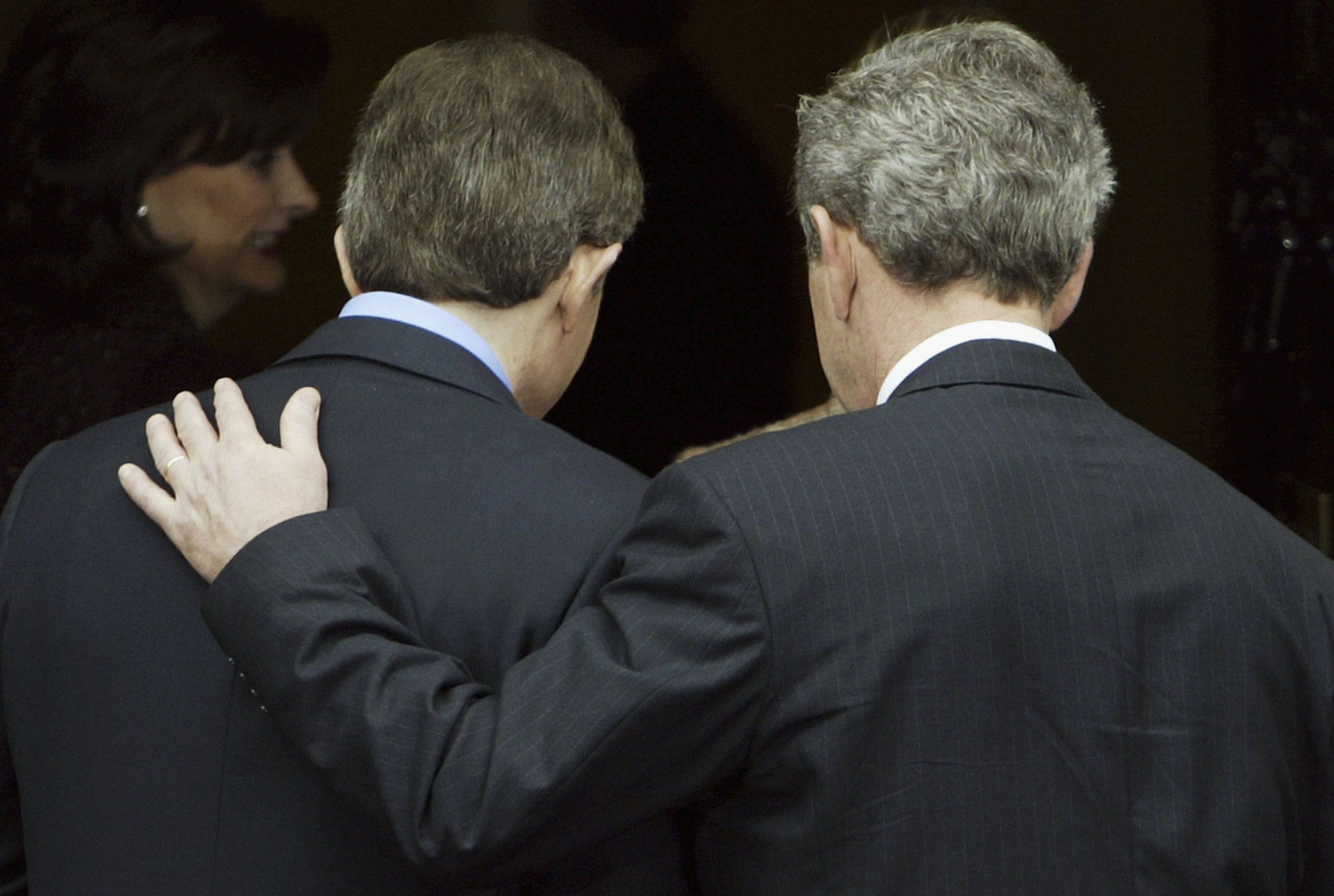
The Chilcot report into Britain's involvement in the Iraq war includes 31 private notes, written by former British Prime Minister Tony Blair to former U.S. President George W. Bush.
The notes reveal Blair's private thoughts before, during and after the 2003 invasion, and shed new light on his relationship with Bush. Here are seven key quotes.
"Action that some will baulk at."
On September 12, 2001, Blair wrote: "There will be many who ask: what is the next stage of this evil? What of their capacity to get hold of biological, chemical and other WMD? We know that there are countries and individuals trading in WMD and/or trying to acquire them. We need a range of sanctions and pressure to stop this.
"Some of this will require action that some will baulk at. But we are better to act now and explain and justify our actions than let the day be put off until some further, perhaps even worse catastrophe occurs."
Just a day after 9/11, the shift in Blair's geopolitical thinking, the beginning of a fateful collaboration on these matters with the U.S., was already in motion.
"A strategy for regime change."
On December 4, 2001, Blair wrote: "At present international opinion would be reluctant, outside the U.S./U.K., to support immediate military action though, for sure, people want to be rid of Saddam. So we need a strategy for regime change that builds over time."
More than a year before the invasion, Blair was already explicitly focused on "regime change."
"I will be with you, whatever."
On July 28, 2002, Blair wrote: "I will be with you, whatever. But this is the moment to assess bluntly the difficulties."
This quote has been seized on by British press as evidence that Blair was committed to joining the U.S. in its war before he had parliamentary approval. Blair insists he was merely seeking to influence the U.S. to pursue action via the U.N. Either way, the quote illustrates how entwined U.S. and U.K. foreign policy already was at this stage.
"The biggest risk we face."
On January 24, 2003, Blair wrote: "The biggest risk we face is internecine fighting between all the rival groups, religions, tribes etc in Iraq when the military strike destabilises the regime. They are perfectly capable, on previous form, of killing each other in large numbers. We will need the backing of the international community and preferably the U.N. to handle it. We will get the blame for any fighting without it…Take it away and this is about U.S. power, naked and in their face."
In the event, the invasion proceeded without the U.N.'s backing, and Blair's predictions here look prescient.
"The issue of good faith."
On February 1, 2004, Blair wrote: "The issue of U.S./U.K. good faith can be laid to rest. We received the intelligence. We honestly believed it."
Blair was writing after the Weapons of Mass Destruction (WMD) supposedly held by Saddam had failed to materialize after the invasion. As noted in the Chilcot report, some of the intelligence Blair used as a justification for war was flawed. But here, Blair is confident that capabilities to develop weapons that were discovered in Iraq would be sufficient to demonstrate the importance of military action to the public.
"The triumph of ideas."
On August 8, 2005, Blair wrote: "This battle increasingly reminds me of fighting revolutionary communism. Ultimately victory lies in the triumph of ideas. "
Blair was referring to Islamic extremism as a growing issue across the globe.
"Bluntly, Iraq pulls us down."
On April 1, 2006, Blair wrote to Bush: "The political position we both find ourselves in, is rather similar. Bluntly, Iraq pulls us down. The sheer weight of propaganda against us crushes the perfectly reasonable case we can make; demoralises our supporters and confuses the public. It leads to a settled determination on the part of our opponents that we are failing and should fail. Yet the case is inherently strong. And both of us want a strong finish to our time in office."
By this time, as the report notes, post-invasion Iraq was proving substantially harder to deal with than the U.K. or U.S. had imagined. Both Blair and Bush were nearing the end of their tenures. In Blair's case especially, the hoped-for escape from Iraq has not arrived. It has haunted the former Prime Minister's legacy like nothing else.
"A fight we have to win."
On May 3, 2007, Blair wrote: "You and I both make the speeches and carry on strong but we are lone voices. New politicians are on their way, keen to distance themselves and above all, disoriented by the heavy thud of each day's bad news. People start to think this is a fight we can't win; when in reality it is a fight we have to win."
Written just over a month before Blair stepped down as prime minister, this note marks the end of an era. Neither the U.K., where the less interventionist Gordon Brown and David Cameron followed Blair, nor the U.S., where Barack Obama made much of his anti-interventionism, would again pursue the same idealistic, liberal interventionism that had been a hallmark of the late 90s and early 00s. For Blair, that was far from a positive development: he feared that extremists would capitalize on the change.
Uncommon Knowledge
Newsweek is committed to challenging conventional wisdom and finding connections in the search for common ground.
Newsweek is committed to challenging conventional wisdom and finding connections in the search for common ground.
About the writer
Josh is a staff writer covering Europe, including politics, policy, immigration and more.
To read how Newsweek uses AI as a newsroom tool, Click here.








